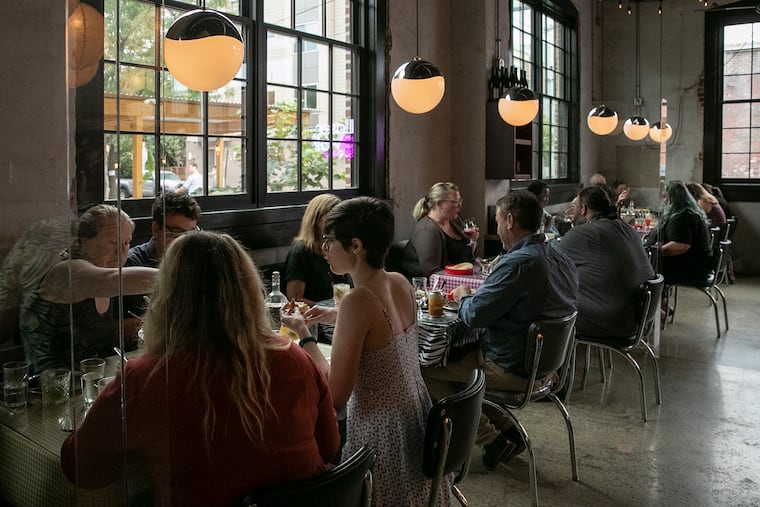Philly could require proof of vaccination for indoor dining, like New York
The proposed mandate would bring Philly closer in line with cities like New York and San Francisco that have required proof of vaccination since August for entry at restaurants.

Philadelphia officials are considering implementing a COVID-19 vaccine mandate at all indoor dining establishments, requiring both patrons and employees to show proof of vaccination, according to two sources briefed on the matter.
The proposed mandate would bring Philly closer in line with cities like New York and San Francisco that have required proof of vaccination since August for entry at restaurants and indoor events. According to sources who were briefed by Philadelphia officials this week, the mandate would likely include standard exemptions for religious and medical reasons, as well as for children under 5.
It remains unclear if the proposed change is part of a larger vaccine mandate shake-up, or isolated to restaurants. Sources said restaurant owners had logistical concerns about the mandate.
Officials didn’t confirm or deny any information about plans for a mandate.
The policy change, which sources said could be announced next week and take effect later this month, would come as the city faces a surge in new cases of COVID-19 and as the omicron variant spreads across the country. Philadelphia currently has its highest case count since the spring, with an average of 463 new cases per day. There were 366 coronavirus patients in Philadelphia hospitals as of Thursday; that number was fewer than 200 in mid-November.
“The city continues to consider strategies to address rising cases and hospitalizations,” Kevin Lessard, a spokesperson for Mayor Jim Kenney, said Thursday. “We ask the public to continue following the Department of Public Health’s COVID-19 guidance: getting vaccinated and boosted, wearing a mask (and double-masking in crowded and indoor settings), getting tested, and staying home if you’re sick.”
Other institutions announced measures Thursday to combat the rising case counts: The University of Pennsylvania announced a ban on indoor social gatherings and the School District of Philadelphia changed its policy for student athletes. Students who play sports won’t be able to opt out of COVID-19 vaccination for religious of medical reasons, as was allowed under a policy announced in October.
Health Commissioner Cheryl Bettigole acknowledged at a news conference last week that new city restrictions may be necessary, and said she favored vaccine and mask requirements over business shutdowns.
“We don’t know what’s coming with omicron,” she said. “I can say we would choose vaccine mandates and masking over more economically damaging measures, to the extent that those can succeed.”
Sources said business affected would be given a grace period for implementation before enforcement begins.
Philadelphia’s current COVID-19 policies require masks indoors, with an option for restaurants and other establishments to require proof of vaccination instead.
How the city would enforce a broader vaccine mandate remains unclear. Enforcement of the current mask mandate is largely left up to individual businesses, with the city’s food inspectors checking for compliance as part of their routine work. And businesses that opt to require vaccination in lieu of masks are responsible for checking the vaccination status of their own employees and customers. The city doesn’t track violations.
The city also has vaccine mandates in place for health-care workers and higher-education employees and students, and a vaccine requirement for city employees is set to take effect in January.
Jabari Jones, president of the West Philadelphia Corridor Collaborative, said he wasn’t personally briefed on the city’s new plan, but one of his colleagues was on a call with city officials about it. He said he worries that additional restrictions would hurt neighborhood restaurants that are already struggling and don’t have money to invest in outdoor dining structures.
“I’m really concerned on what this does to the bottom line for a lot of restaurants that are still struggling to make ends meet every day,” he said. “The ones that can only use indoor dining are the ones that are going to feel the brunt of this decision.”
Jones said he’s also concerned that a vaccination requirement for dining would go into effect shortly before new legislation that makes outdoor dining structures permanent in some, but not all, areas of the city. Restaurants left out of pre-approved areas will have to remove their dining structures currently built over parking spaces or seek individual approval from City Council to keep them.
Jones said it’s not fair that restaurants outside those boundaries or without existing outdoor dining structures won’t have anywhere to serve unvaccinated patrons.
“It’s very counterproductive and it sends a message to businesses that they’re making it harder for businesses in some neighborhoods to be able to operate,” he said.
Staff writer Michael Klein contributed to this article.